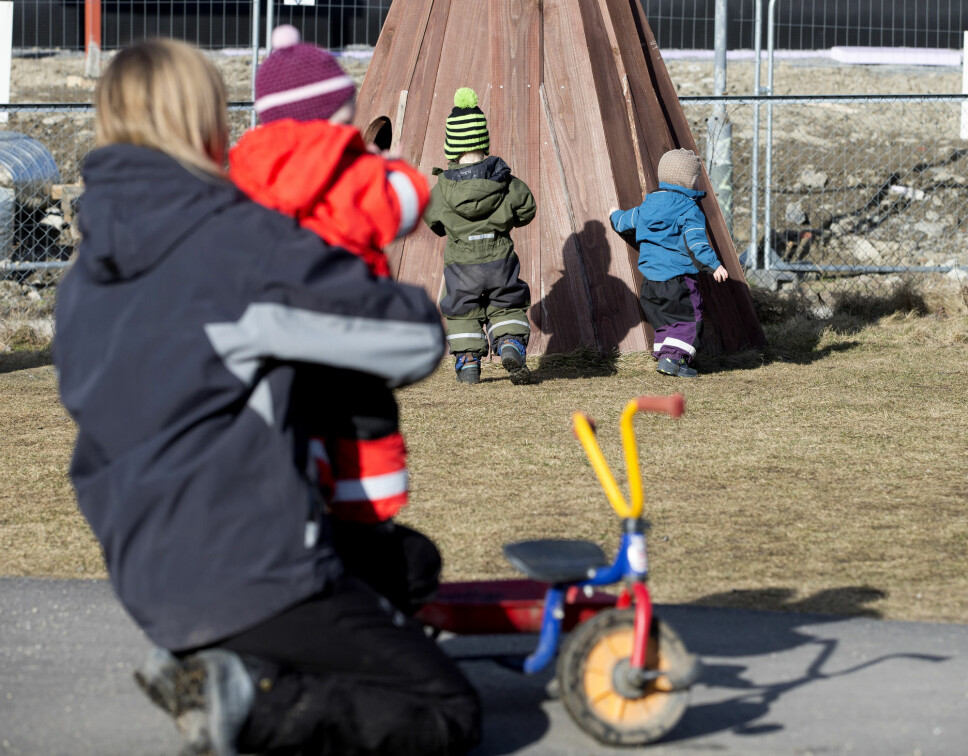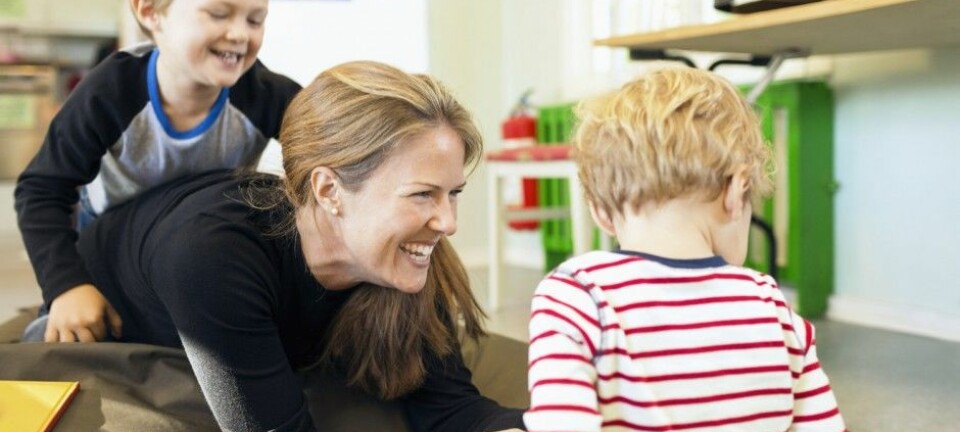
How do kindergarten staff handle getting angry with a child?
They often feel uncomfortable when they resort to raising their voice or using physical force, according to a study of 57 preschool employees.
A two-year-old strikes another child in the head with a branch. A four-year-old doesn’t do what he is told.
There are plenty of situations that can test your patience during a day in preschool.
Sometimes employees get frustrated too, according to a study from four Norwegian kindergartens (internationally called preschools, day-care centres or ECCD centres) in Western Norway in 2013-2014. The Norwegian school system begins with an offering of preschool/daycare (barnehage in Norwegian) to children aged 1 to 5.
Malin tells about four-year-old Tom who refuses to put on rainwear. Tom cries and Malin feels her anger mounting. This isn’t the first time they’ve had a conflict in the coatroom.
“I end up putting him on my lap and forcing his clothes on. He gets even angrier, and we’re working up a sweat."
Afterwards, she felt she’d failed because Tom goes out, she’s annoyed and the two don't talk about what happened.
Regret using physical force
Emotions can take over when the staff is stressed and the children resist direction, says Ruth Ingrid Skoglund, one of two researchers behind the study.
“Staff may feel irritated and raise their voice. They may also resort to using physical force, such as taking children firmly by the arm or taking them onto their lap against the child's will,” says Skoglund, an associate professor of kindergarten pedagogy at the University College of Western Norway.
The staff should be professional and pay attention to the children's needs – and not let their own emotions take over. But it's not always that easy, like when they’ve given direction repeatedly and the children continue to challenge them.
Oda tells about one time when she became so exasperated with one child tormenting another that she grabbed the hood of the child's jacket and swung the child around.
It was a bad way to handle the situation, she believes.
The kindergarten employees participating in the study have often had a bad conscience after they’ve lost their temper or used physical force.
Is it okay to get angry at the children?
In group interviews of three to five employees, they discussed what they do when they get angry. A total of 57 kindergarten employees participated in the study.
Thirty of the employees also wrote about a specific conflict with the children and how they experienced it.
Staff strive to be on equal footing with the children and to see things from their perspective. Children often have good reasons for behaving the way they do.
Getting angry with the child instead of trying to understand him or her feels like a professional failure, Skoglund says.
“It’s not okay to express anger in a way that violates the child. This is important to the employees.
“At the same time, getting angry, annoyed and frustrated is certainly a natural reaction. Staff recognize this too, when they’re able to handle their own emotions in an educational way,” she says.
Emergency solution when you’re about to boil over
Important learning opportunities for the children to understand emotions are embedded in these challenging situations.
"I can say: ‘Now I'm angry. Look at my face,’" says Gina, who was interviewed for the study.
"They can try to read my face too. Children should be allowed to express their feelings and be angry. We need to teach them how to express their feelings and not get physical, like hitting or pushing or biting when they get frustrated,” she says.
Staff have several ways of dealing with their own anger. For example, they can take a step back and try to distance themselves from their emotions.
Some get so angry that they ask a colleague to take over. The study participants had mixed feelings about this strategy.

Skoglund says, “Some participants thought this solution should only be used in an emergency. Kindergarten employees should be able to handle the situations that arise. At the same time, having a colleague step in can facilitate a situation where the staff member could risk losing control with a child.”
Rushing creates shorter fuse
Fuses can get extra short when they don’t have enough time, say employees, and they end up feeling inadequate.
"I think it's incredibly difficult, because afterwards I have such a poor conscience and I'm so unhappy with myself," says Carol, another participant.
And the children don’t like adults who scold or rush them, according to a 2012 NTNU study of 170 children between the ages of 4 and 6 from the Sør-Trøndelag region. In a Danish study from 2016, eleven six-year-olds said they didn’t think kindergarten was fun when staff were in a bad mood.
Understaffing also creates stress and lowers the threshold for handling situations poorly, according to employees in Western Norway. The researchers did not investigate employees’ working conditions as part of the study.
Want to learn from poorly handled situations
Skoglund has worked as a kindergarten teacher and recognizes herself in the survey responses.
“Just having too little time, and knowing that you could have dealt with things differently afterwards, is a daily occurrence,” she says.
Employees tend to take a lot of responsibility for these situations and often blame themselves too much.
“The first thing they think is: ‘The way I acted wasn’t in line with the kindergarten values or my own values in that situation,’” Skoglund says.
Kindergartens vary in how much the staff talk with each other about losing their temper with the children.
Skoglund believes it is important to discuss difficult episodes with colleagues so that they can learn from them and don’t experience them as private defeats.
“Doing this doesn’t remove the individual’s personal responsibility, but staff can discuss what conditions are in place for doing a good job,” she says.
Stressed about preventing infection
Norwegian kindergartens recently reopened after being closed for several weeks during the corona crisis.
These are special days in the kindergarten, where the children are together in smaller groups than usual, and the staff has to manage social distancing and hygiene.
Skoglund believes the conditions could create stress, and potentially anger.
“I think this is a stressful situation that needs to be raised among staff. How do we share tasks and talk to each other, how do we follow the safety guidelines and at the same time give the children a full educational programme?
Translated by: Ingrid P. Nuse
Reference:
Ruth Ingrid Skoglund and Ingvild Åmot: When Anger Arises in the Interaction with Children in Kindergartens – The Staff's Reactions to Children's Resistance. Scandinavian Journal of Educational Research, March 12, 2020. doi: 10.1080 / 00313831.2020.1739138.
———
Read the Norwegian version of this on forskning.no
































